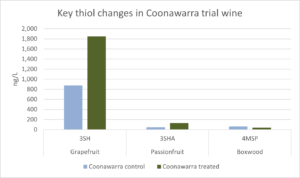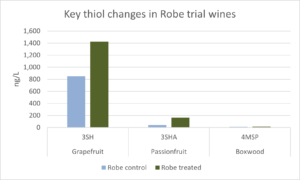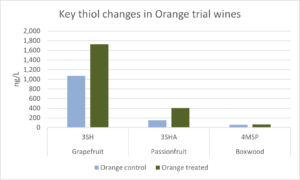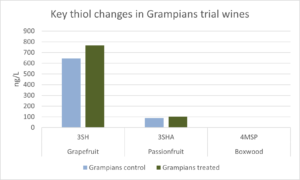Four growers trialled foliar spraying in their vineyards in vintage 2023. The regions where the trials were conducted were Coonawarra and Robe in SA, Grampians in VIC and Orange in NSW.
Details of the trial design in the four vineyards, plus results and comments from the producers, are provided below.
Coonawarra, SA
Variety: Sauvignon Blanc
Trellis design: Catch wires left up.
Row spacing: 2.5 m row spacing and 1.5 m vine spacing
Sprays and rates applied: Sulfur @ 6.3 kg/ha and urea @ 21.8 kg/ha
Crop level: 10 t/ha
Time between sprays: 14 days
Grower comments: Visually there was no difference to the foliage. There was a greater instance of Botrytis in the trial rows as compared to the control.
Reason for performing trial: Our main reason for engaging with the AWRI on this project was to assist in building knowledge of aroma development in the vineyard and how this can influence wine style.

Robe (Limestone Coast), SA
Variety: Sauvignon Blanc
Trellis design: Cane pruned VSP
Sprays and rates applied: Sulfur @ 6.3 kg/ha and urea @ 22 kg/ha
Crop level: 12.8 t/ha
Time between sprays: 15 days
Grower comments: Slight leaf burn, due to conditions not being ideal. Botrytis present.

Orange, NSW
Variety: Sauvignon Blanc
Trellis design: Single wire, VSP
Row spacing: 3 m, with 2 m vine spacing
Sprays and rates applied: Sulfur @ 6.3 kg/ha + an organic certified nitrogen product (10% nitrogen) was applied at 5 L/ha.
Crop level: 4 t/ha
Time between sprays: 12 days
Grower comments: Canopy feedback: both had healthy canopies, nil disease during the season and with minimal active tip growth leading up to harvest. Berry colour: green with good shading. Berry size: medium, ~13 mm. Yield quite low 4 t/ha; however, this was a vineyard theme for the season.
Reason for performing trial: Our main reason for engaging with the AWRI on this project was to assist in building knowledge of aroma development in the vineyard and how this can influence wine style. The AWRI have been great to work with. They provided clear objectives and instructions about the trial, and gave us timely updates throughout the season.
Winemaker comments: In a blind classification tasting the treated wine received a 2 point higher score, so a silver as opposed to a high bronze, using the 100 point system. Vine balance and fruit looked very similar.

Grampians, Victoria
Variety: Pinot Gris
Trellis design: VSP, single wire at one point one metre. Spur pruned, one pair of foliage wires
Row spacing: 2.75 m row spacing and 1.5 m vine spacing
Sprays and rates applied: A fertiliser containing ammonium thiosulfate + co factors (boron, manganese, cobalt, molybdenum) was applied. This equated to:
Sulfur: ~2.8 kg/ha
Nitrogen: ~1.3 kg/ha
Crop level: 4.6 t/ha
Time between sprays: 12 days
Grower comments: Tonnage in vintage 2023 was a down a little due to cold snaps in the growing season. Normally we see yields around 6 t/ha in this vineyard.
Reason for performing trial: Pinot Gris is sometimes recognised as being a neutral wine/variety, so we were interested in seeing if we could boost the flavour profile through this technique.
Winemaker comments: As a winemaker I prefer the treated wine as it seems to have better aromatics.

Acknowledgement
 The AWRI’s foliar spraying practice change project is supported by Wine Australia, with levies from Australia’s grapegrowers and winemakers and matching funding from the Australian Government.
The AWRI’s foliar spraying practice change project is supported by Wine Australia, with levies from Australia’s grapegrowers and winemakers and matching funding from the Australian Government.

